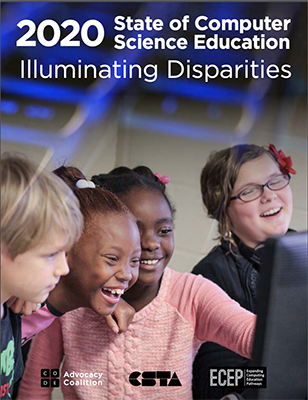2020 State of Computer Science Report

The "2020 State of Computer Science Education: Illuminating Disparities" was just released and can be downloaded. This report details the progress made by all 50 states and the District of Columbia in adopting policies and initiatives for K-12 computer science education. For the first time it contains data about disability reported from 11 states (see pages 17 and 95). In 2019, in the 11 states 12.9% of K-12 students in public education were served by the Individuals with Disabilities Education Act (IDEA), while only 7.6% of students who took at least one computer science course were served under IDEA. This is significant because data on students with disabilities in K-12 computing courses is often not collected or reported. Also, for the first time, data on English language learners and students eligible for free and reduced-price meals is reported. It is worth noting that in 2019 the relative representation of students with disabilities (under IDEA) in computer science courses is at about the same level, 7.6/12.9 = 58.9%, as women 29/50 = 58.0% taking AP computer science courses.
The report also highlights the work of Amanda Rodda at the Washington State School for the Blind and Sarah Ciras at the Landmark School that serves students with learning disabilities, both of whom participate in the AccessCSforAll project that addresses accessible computer science education at the K-12 level.
Congratulations to the teams at the Code.org Advocacy Coalition, CSTA, and ECEP for putting together this very informative report on computer science progress in K-12 education.